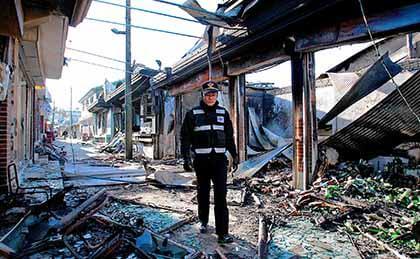By Connor Adams Sheets
Escalating Korean tensions are back in the news again with a fresh attack by North Korea on its neighbor to the south and the reverberations are being felt in Queens.
The New York Korean population, a large percentage of which calls northeast Queens home, has mixed reactions to the confrontation.
The United States and South Korea have acted out war games scenarios and naval exercises off the coast of the country starting this past Sunday in response to a Nov. 23 artillery attack by the North Korean military on the tiny South Korean island of Yeonpyeong, which left homes in flames and four South Koreans dead. On Friday, the North fired additional rounds that landed near the island.
The attacks have been widely interpreted as an attempt by North Korea to strengthen its government in preparation for the passing of the torch from current leader Kim Jong-Il to his son Kim Jong-un.
S.J. Jung, board president of the Flushing-based MinKwon Center for Community Action and a popular leader in Flushing’s Korean community, said that although the attack requires “strong condemnation,” there is a nonmilitary solution to the crisis as long as the North does not attack again.
“Many Korean Americans believe that any differences should be resolved by peaceful means and dialogue rather than military clashes,” Jung said. “I strongly believe it is not in the best interest of the United States or the Korean to stage a full-scale war.”
Terence Park, president of the Our Flushing Political Coalition and another well-known leader of Flushing’s Korean community, called the aggression “unacceptable,” blaming it on three factors driving the xenophobic rogue state.
“The first reason is North Korea’s harsh economic situation — they’re using their military as a bargaining chip and trying to revitalize. The second reason is to put power on Kim Jong-Il’s son,” he explained. “The third reason is to … expel all the American troops in the Korean Peninsula and abolish the treaty between South Korea, USA and Japan. If we do that, they will come down and take the whole country.”
Despite the severity of the events, Arckii Kim, assistant director of the Korean American Association of Greater New York, said she believes most people in Korea are less alarmed than Korean Americans are.
“I talked to my mom in South Korea and she said, ‘Don’t worry about it, there are just a lot of changes going in North Korea.’ I think in South Korea now it’s a lot more calmed down because there were just generational and money issues in North Korea,” she said. “We always have these types of situations, so people in Korea are calmed down, but Koreans here are all like, ‘Oh, my God, it’s going to be war!’”
But Park disagreed and said many Koreans around the world are concerned that the situation could escalate but that people in Korea are most worried.
“Psychologically there is more anxiety and more feeling on their skin in Korea,” he said. “When you have a fire in your backyard, do you feel more danger than if it’s far away?”
There were more troubling developments involving Korea this week, as WikiLeaks released documents showing that North Korea might be helping Iran with its nuclear program.
Park said the world must act to stop such activity.
“It is very dangerous that they are working together,” he said. “Western nations need to come together very tightly for the safety of all nations around the world, and we must fight together against these terrorist nations.”
Reach reporter Connor Adams Sheets by e-mail at csheets@cnglocal.com or by phone at 718-260-4538.



































